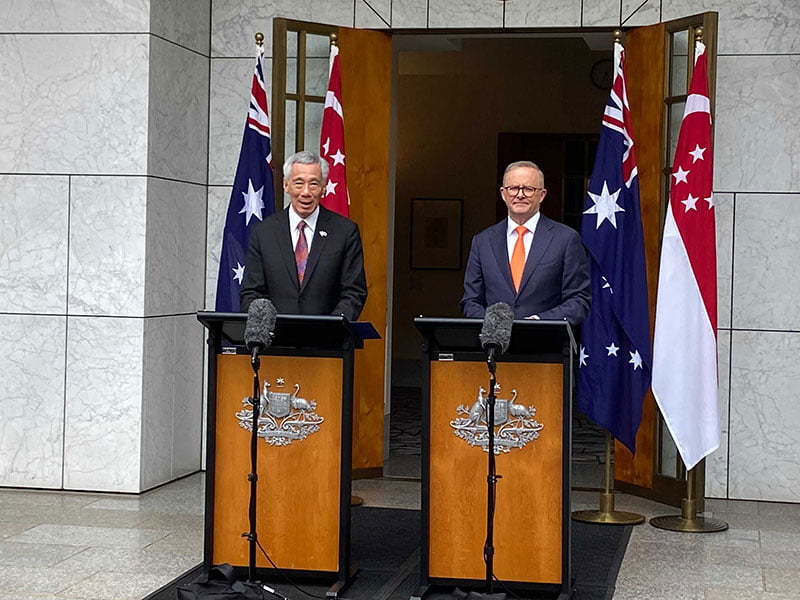The Singapore-Australia Green Economy Agreement will introduce a new innovation grants program and a green skills roundtable early next year, as the federal government commits $19.6 million to implement the agreement.
The agreement was released at the end of the 7th Singapore-Australia Annual Leaders’ Meeting on Tuesday, the first official in-person meeting between Prime Minister Anthony Albanese and Singaporean Prime Minister Lee Hsien Loong.

Currently housed under the Green Economy Agreement (GEA) is a blend of 17 ongoing, soon to commence, and signed initiatives. The initial investment committed by the federal government will be used over four years.
Trade Minister Don Farrell and Singapore’s Trade and Industry Minister Gan Kim Yong were the ministerial signatories to the GEA.
As the prime ministers met, CSIRO signed a five-year Master Research Collaboration Agreement with its Singaporean counterpart A*STAR. The science agencies will seek opportunities for research project collaborations involving a representative from each of the agencies alongside a Singapore-based and an Australia-based industry partner.
These projects will focus on circular economy and low emissions technology (renewable energy, biofuels, and carbon capture, utilisation and storage), food (including alternative proteins and plant genetics for urban food production), digital environment (urban environment management), and advanced manufacturing and future materials.
Further, in the first quarter of 2023 the governments will host a roundtable to support the development of the skills and capabilities needed for green economic growth.
In the same period, a joint grants and business matching service will also be launched to help small to medium sized businesses in priority green economy sectors:
- Renewable and clean energy;
- Sustainable Agribusiness and food;
- Built environment and infrastructure;
- Advanced Manufacturing and Sustainable Materials;
- Waste management and circular economy;
- Green Transportation and Logistics;
- Energy Efficient Technologies and Products; and
- Environmental Monitoring, Analysis and Assessment
Also included under the GEA is the Digital Verification Platform, which seeks to replace paper trade documents with “high-integrity verifiable digital documents”. This follows an initial successful trial in 2021 between Singapore and Australia.
Singaporean Prime Minister Lee Hsien Loong said he was pleased to sign the Green Economy Agreement (GEA) and confirmed that it is the world’s first agreement of its kind which hopes to “support the transition of our countries to net zero emissions as well as create jobs and growth opportunities in green sectors and promote the development and commercialisation of green technology”.
Prime Minister Albanese described Singapore as “one of the most innovative economies in the world”.
“They have been extraordinary at scientific breakthroughs, at commercialising those opportunities as well and they are known for innovative companies. When I have visited Singapore, I visited start-ups, it is one of the things that Singapore does really, really well,” Mr Albanese said.
However, Mr Albanese noted that the country lacks the space to the renewable energy infrastructure needed to reach net-zero emissions. As such, Mr Albanese said that exporting clean energy to the city state presents the “the ultimate win-win”.
Both Prime Ministers said they hope the GEA will prompt other countries to seek further cooperation on climate change mitigation and other environmental issues.
The Prime Ministers also discussed improving counter-terrorism, cybersecurity and border security as well as opportunities “to strengthen information exchange and cooperation to protect our citizens in the digital space, including through a bilateral Memorandum of Understanding on Cooperation in the Enforcement of Laws on Certain Unsolicited Communications signed in July 2022”, according to a communique.
The bilateral Supply Chains Working Group established in September 2022 will also begin work on a Food Pact to boost resilience and increase investment flows.
The GEA highlights seven key priority areas of cooperation, although there are currently no planned initiatives focusing exclusively on carbon market development. The remaining six priority areas are:
- Trade and investment;
- Standard and conformance;
- Green and transition finance;
- Clean energy, decarbonisation, and technology;
- Skills and capabilities for green growth; and
- Engagements and partnerships
Ahead of the leaders meeting, Singapore-based researchers gained priority access to the Australian Synchrotron as the Australian Nuclear Science and Technology Organisation signed as the first partner to Singapore’s International Synchrotron Access Programme being hosted by the National University of Singapore.
Do you know more? Contact James Riley via Email.

